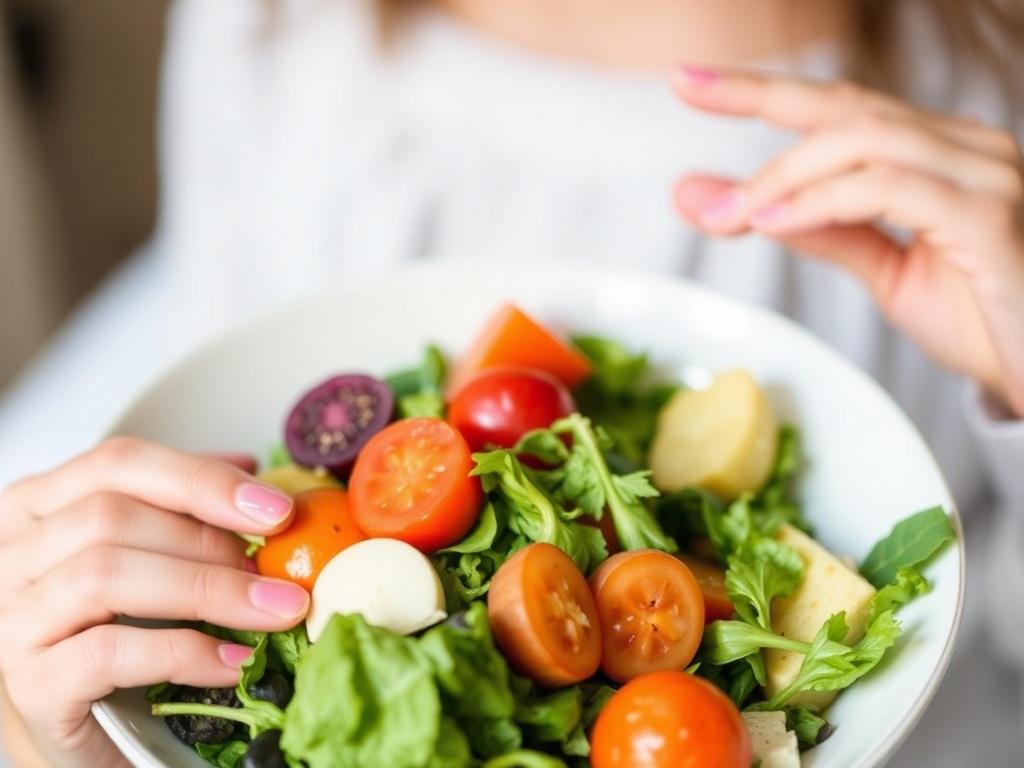Содержание статьи
- 1 Why Diet Matters for Your Skin
- 2 Essential Nutrients for Radiant Skin
- 3 Foods to Include in the Best Diet for Clear, Glowing Skin
- 4 Foods and Habits to Avoid for Clear Skin
- 5 Creating a Skin-Friendly Meal Plan: What a Day Looks Like
- 6 Hydration and Skin Health
- 7 Supplements: Helpful or Not?
- 8 Lifestyle Tips to Complement Your Diet for Clear, Glowing Skin
- 9 Common Myths About Diet and Skin
- 10 Personalizing Your Skin Diet
- 11 The Impact of Gut Health on Your Skin
- 12 Seasonal Skin Diet Adjustments
- 13 Quick Tips to Get Started on the Best Diet for Clear, Glowing Skin
- 14 Conclusion
When it comes to achieving clear, glowing skin, many people focus on skincare products, treatments, and routines, often overlooking one of the most powerful tools: diet. What you eat plays a crucial role in the health and appearance of your skin. The best diet for clear, glowing skin isn’t about restrictive eating or expensive supplements. Instead, it’s about nourishing your body with the right balance of vitamins, minerals, and antioxidants that promote skin repair, hydration, and radiance from within.
In this article, we’ll explore the essential components of a skin-loving diet, discuss specific foods that can transform your complexion, and help you understand how these foods work to combat common skin issues like acne, dryness, and dullness. Whether you’re a skincare enthusiast or just someone looking to improve your skin naturally, understanding the link between diet and skin health is key.
Why Diet Matters for Your Skin

Our skin reflects our internal health. When we eat a balanced, nutrient-rich diet, it can improve collagen production, reduce inflammation, and protect our skin from environmental damage. On the other hand, consuming too much sugar, processed foods, and unhealthy fats can trigger breakouts, redness, and premature aging.
The skin is the largest organ of the body, and it needs a diverse range of nutrients to stay healthy. Think of your diet as the foundation of your skin’s well-being. Without proper nourishment, even the best lotions and serums might not achieve the results you want.
But what exactly does the best diet for clear, glowing skin look like? Let’s dive into the key nutrients and foods that deserve a spot on your plate.
Essential Nutrients for Radiant Skin
Certain vitamins and minerals have been scientifically linked to improved skin appearance. Understanding these essentials can help you choose foods wisely.
- Vitamin C: Crucial for collagen synthesis, it helps maintain skin elasticity and repair damage. It also has antioxidant properties to fight free radicals.
- Vitamin A: Supports cell turnover and can help prevent acne and dryness. It’s found in both animal sources and in its plant-based precursor, beta-carotene.
- Vitamin E: Known for its ability to protect the skin from oxidative stress and UV damage, vitamin E also supports skin moisturization.
- Zinc: Plays a key role in reducing inflammation and aiding wound healing, making it beneficial for acne-prone skin.
- Omega-3 Fatty Acids: These healthy fats reduce inflammation and help maintain the skin’s lipid barrier, keeping it hydrated and supple.
- Protein: Needed for collagen and elastin production, both of which are vital for skin structure and firmness.
Many of these nutrients work synergistically. For example, vitamin C enhances collagen production, but collagen synthesis also depends on adequate protein intake. Omega-3 fatty acids can reduce inflammation, complementing zinc’s anti-inflammatory effects.
Foods to Include in the Best Diet for Clear, Glowing Skin
The best diet for clear, glowing skin emphasizes whole, nutrient-dense foods. Here’s a list of the top skin-friendly foods along with explanations of their benefits:
| Food | Key Nutrients | Benefits for Skin |
|---|---|---|
| Fatty Fish (Salmon, Mackerel) | Omega-3 Fatty Acids, Protein, Vitamin E | Improves skin hydration, reduces inflammation, fights dryness and redness |
| Leafy Greens (Spinach, Kale) | Vitamin A, Vitamin C, Vitamin E | Supports cell turnover, protects against oxidative damage, brightens complexion |
| Berries (Blueberries, Strawberries) | Vitamin C, Antioxidants | Neutralizes free radicals, enhances collagen production |
| Nuts & Seeds (Walnuts, Sunflower Seeds) | Vitamin E, Zinc, Omega-3 Fatty Acids | Protects skin cell membranes, reduces inflammation, supports healing |
| Sweet Potatoes & Carrots | Beta-Carotene (Vitamin A precursor) | Prevents dryness, promotes healthy cell growth |
| Green Tea | Polyphenols, Antioxidants | Reduces redness, combats premature aging, soothes irritation |
| Avocados | Healthy Fats, Vitamins E & C | Hydrates skin from inside, improves elasticity and softness |
| Tomatoes | Vitamin C, Lycopene | Protects against UV damage, improves skin tone |
| Watermelon | Water, Vitamins A & C | Hydrates, promotes cell repair and renewal |
Including a variety of these foods in your daily meals ensures you cover the spectrum of nutrients your skin needs.
Foods and Habits to Avoid for Clear Skin
Just as certain foods support skin health, others can undermine it. Minimizing or avoiding these can help prevent breakouts, irritation, and dullness.
- Refined Sugars and Sweets: Excess sugar spikes insulin which can increase oil production, leading to acne.
- Processed and Fried Foods: Often high in unhealthy fats and additives that promote inflammation.
- Dairy Products: For some people, dairy can trigger breakouts, especially milk and cheese.
- Excessive Alcohol: Dehydrates the skin and impairs its ability to repair itself.
- Caffeine Overload: Can dry out skin and cause redness when consumed in large amounts.
Being mindful of these can greatly improve the overall health and clarity of your skin.
Creating a Skin-Friendly Meal Plan: What a Day Looks Like
You might be wondering how to put this into practice. Here’s an example of a daily meal plan based on the best diet for clear, glowing skin:
| Meal | Menu | Skin Benefits |
|---|---|---|
| Breakfast | Spinach and berry smoothie with Greek yogurt and chia seeds | Vitamin C and antioxidants from berries, protein for collagen, omega-3 from chia seeds |
| Lunch | Grilled salmon salad with mixed greens, tomatoes, avocado, and sunflower seeds | Omega-3 fatty acids, vitamins A, C, and E, healthy fats for hydration |
| Snack | Carrot sticks and hummus | Beta-carotene for skin repair, protein and zinc from chickpeas |
| Dinner | Sweet potato, steamed kale, and quinoa bowl topped with walnuts | Beta-carotene, antioxidants, protein, and omega-3 for skin elasticity and hydration |
| Drinks | Plenty of water, green tea | Hydration, antioxidant protection, reduced inflammation |
This plan balances macro and micronutrients while offering delicious meals that leave your skin nourished and radiant.
Hydration and Skin Health
While focusing on food, don’t forget the importance of hydration. Drinking enough water is fundamental to achieving glowing skin. Water helps flush toxins from your body, improves blood circulation, and keeps skin cells plump and hydrated. Aim for at least eight 8-ounce glasses of water a day, and adjust according to your activity level and environment.
Herbal teas like green tea or chamomile have additional antioxidants that benefit your skin, making them great alternatives to sugary drinks or coffee.
Supplements: Helpful or Not?

Sometimes, despite your best efforts, you might find it challenging to get enough skin-loving nutrients from diet alone. In those cases, supplements like vitamin C, vitamin E, omega-3 fatty acids, or zinc can be beneficial. However, supplements should never replace whole foods because natural sources provide a complex mix of compounds that work together.
Before starting any supplement regimen, consider consulting with a healthcare professional, especially if you have underlying health conditions.
Lifestyle Tips to Complement Your Diet for Clear, Glowing Skin
Diet is the foundation, but lifestyle habits can amplify the effect on your skin’s condition. Here are some simple tips:
- Get Enough Sleep: Restful sleep allows skin cells to repair and regenerate.
- Manage Stress: Chronic stress can lead to skin flare-ups; try yoga, meditation, or walks.
- Exercise Regularly: Promotes circulation and toxin elimination.
- Protect Your Skin from Sun: Use sunscreen to prevent damage that diet alone can’t fix.
- Maintain a Consistent Skincare Routine: Clean, moisturize, and use products suitable for your skin type.
By pairing these habits with your skin-friendly diet, you create a holistic approach that yields the best glowing results.
Common Myths About Diet and Skin
It’s easy to get overwhelmed by conflicting information about diet and skin care. Let’s debunk a few common myths:
- Myth 1: Chocolate Causes Acne. Chocolate itself isn’t a direct cause of acne. It’s often the sugar and dairy in many chocolate products that could contribute.
- Myth 2: Only Topical Products Can Clear Skin. While skincare is important, your diet plays a crucial internal role.
- Myth 3: More Collagen Supplements Equal Better Skin. Collagen supplements can help, but the skin primarily needs vitamins C, protein, and a healthy diet to stimulate natural collagen production.
- Myth 4: Gluten Causes Skin Issues for Everyone. Gluten only affects some people with sensitivities; it’s not a universal skin problem.
Being informed helps you make better choices for your skin and your overall health.
Personalizing Your Skin Diet
Everyone’s skin is unique, so what works best for one person might differ for another. Consider keeping a food journal to track which foods help or worsen your skin condition. For example, you might notice your skin improves with more omega-3 intake or that certain dairy products trigger breakouts.
Experiment with different foods and observe how your complexion responds over several weeks. Customizing your diet is a powerful way to achieve your best skin.
The Impact of Gut Health on Your Skin
Emerging research highlights the gut-skin axis, a connection between gut microbiome health and skin condition. A balanced diet rich in probiotics (found in yogurt, kefir, sauerkraut) and prebiotic fibers (found in garlic, onions, bananas) supports gut health, which in turn may reduce skin inflammation and promote clearer skin.
Thus, the best diet for clear, glowing skin also encourages a diverse and healthy gut microbiome. Incorporate fermented foods and fiber-rich plant foods for double the skin benefits.
Seasonal Skin Diet Adjustments
Your skin’s needs can change with the seasons, and adjusting your diet accordingly can maintain that glow all year long.
- Summer: Focus on hydrating foods like watermelon, cucumber, and leafy greens to offset dehydration.
- Winter: Incorporate more healthy fats and vitamin-rich root vegetables to combat dryness caused by cold weather.
- Spring and Fall: Emphasize detoxifying foods such as citrus fruits and green tea to refresh the skin.
Listening to your body’s needs and seasonally rotating your diet can further enhance your skin’s appearance.
Quick Tips to Get Started on the Best Diet for Clear, Glowing Skin

- Start your day with a fruit and vegetable-rich smoothie to kickstart antioxidant intake.
- Swap out sugary snacks for nuts, seeds, or berries to reduce inflammation.
- Incorporate fatty fish or plant-based omega-3 sources at least twice a week.
- Drink plenty of water and herbal teas instead of soda or caffeinated drinks.
- Experiment with meal prepping to ensure you always have skin-friendly meals ready.
Conclusion
Achieving clear, glowing skin isn’t a mystery; it begins from within. The best diet for radiant skin is one rich in vitamins, minerals, antioxidants, healthy fats, and protein. By choosing whole, nutrient-dense foods such as fatty fish, leafy greens, berries, nuts, and colorful vegetables, and by avoiding refined sugars and processed foods, you set the stage for your skin to shine naturally. Complementing your diet with good hydration, mindful lifestyle habits, and understanding your unique skin needs will help you maintain that enviable glow long-term. Remember, consistent nourishment paired with patience is your best formula for skin health that radiates from the inside out.

